Are Interest Rates Going Up Again? And What Does That Mean?
Written By: Jacob Baugher, Financial Advisor
The short answer: Maybe. A lot of experts seem to expect it, and the Federal Reserve’s chairman, Jerome Powell, was recently quoted saying: “It’s very premature, in my view, to think about or be talking about pausing our rate hike. We have a ways to go.” In addition, he also stated “…if we overtighten, then we have the ability with our tools, which are powerful, to, as we showed at the beginning of the pandemic episode, we can support economic activity strongly if that happens if that’s necessary. On the other hand, if you make the mistake in the other direction and you let this drag on, then it’s a year or two down the road, and you’re realizing, inflation behaving the way it can, you’re realizing you didn’t actually get it, you have to go back in.” (Transcript of Chair Powell’s Press Conference)
That’s a lot to unravel, so let’s take a step back.
Two of the main goals of the Federal Reserve are price stability (as in controlling inflation) and maximizing employment. It acts upon these goals through monetary policy – distinct and separate from the fiscal policy set by Congress (think budgeting and deficits). While neither goal has official priority over the other, at different times the focus of the Federal Reserve is directed at steering monetary policy in one way or another to address specific issues with high unemployment or high inflation.
Because high inflation has been the major economic issue this year, the Federal Reserve has been working on correcting the problem by raising interest rates. While it doesn’t directly control the interest rates on mortgages or credit cards, it does control the “federal funds rate” which is the interest rate banks and other lenders use to borrow from their reserves in the short term. This produces a cascading effect as those institutions pass on the increased interest charge to consumers. This also increases the cost for businesses to borrow money which is one of the many contributing reasons we have seen the stock market decline this year.
The impacts of rising interest rates aren’t necessarily immediate or certain, but the rationale is simple: as it costs more to borrow money, consumers and businesses hold off on major expenses, which reduces demand, which reduces prices. You may have heard a lot of fearful talk about an upcoming recession which could be one of the consequences of continuous interest rate hikes: if demand continues to fall, then business profits will fall which could result in layoffs and more unemployment, and a volatile stock market.
We don’t know for sure what the Federal Reserve will do at their next meeting, how high-interest rates will go, how long they will remain elevated, or what the potential fallout may be from all these decisions. But we can interpret Chairman Powell’s comments above and throughout this year to indicate their determination to solve the inflation problem first and to deal with whatever consequences develop later on.
You can read more information about this topic here:
Premarket stocks: Interest rates will keep rising. How high will they go? | CNN Business
Fed’s Interest Rate Hikes in 2022 – What the November Raise Means for You (moneycrashers.com)
If you have any questions, we’d love to chat! Call us at 844-CARLSON (844-227-5766) today!
Get on our email list to receive these updates in your inbox!
Ready to Take The Next Step?
For more information about any of the products and services listed here, schedule a free assessment today or register to attend a seminar.

